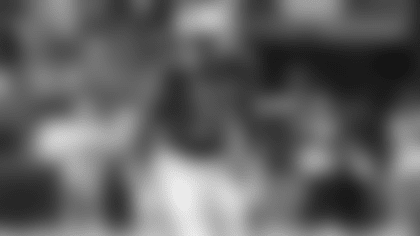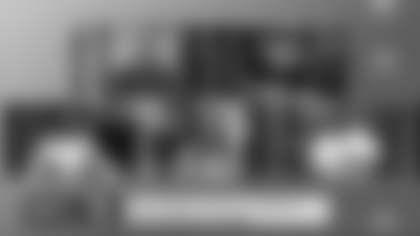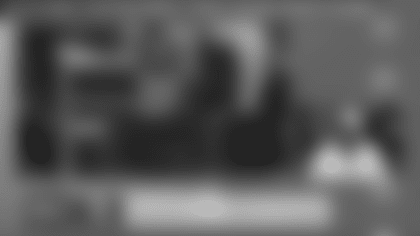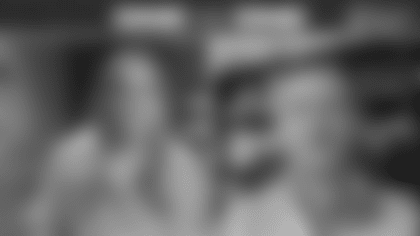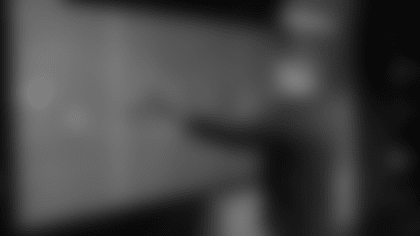*Vikings Offensive Coordinator Norv Turner *
Q: What are your memories of Adrian Peterson against the Chargers in that game back in 2007?
A: Well, I've been asked that a number of times. Actually I would think I'm maybe the only guy [to be a part of both the most rushing yards in a game and most receiving yards in a game]. When I was with the Rams, we had Flipper Anderson go crazy and he holds the record for the most receiving yards in a single game, I was on the good side of that one. Obviously in that game in 2007, what I remember was in the first half we actually I thought contained Adrian [Peterson] pretty well. He had been playing at a really high level and then the first third down of the second half, he breaks off that 74-yard run, that's how I remember it. It all broke loose then. We couldn't get him on the ground and he looked like a guy that was possessed.
Q: Are you hoping he can do something similar this weekend?
A: Well, he really ran like that on Sunday and it's interesting talking to him. As well as he looked and as well as he ran, there's things that he felt he could do better. He hasn't played in quite a long time and he hasn't had that kind of work load, so he was tired in the game. I think every time you get an opportunity to go like that – and he's done some extra conditioning this week – yeah, I want to see him take off and go.
Q: Is that fatigue what played into him putting the ball on the ground a few times?
A: I think the combination of not having had that many carries and then having been tackled and being in that kind of competition. Obviously it is something we work on every day. He's been really good about the way he works on it. Obviously it's an issue we're addressing.
Q: What does it mean to go up against your former team?
A: I've coached I think 10 different teams or a couple of places twice. You get used to it. There are some guys still on this team. There aren't a lot of guys left on this team. It's only been two seasons removed, but there aren't a lot of guys left, but there are some guys that I am awfully close with that mean a lot to me. It's just part of this league now.
Q: Do you take any credit for Philip Rivers having a very consistent career?
A: I don't know the word credit. Obviously when you take a guy and start coaching and it's his second year starting and you put in a new system, you build with the people around him and we grew and we were an outstanding offense. When we had that group together, we were an outstanding offense. When we started losing some of our key linemen and key players, we weren't as good. But Philip, he's as good as I've been around.
Q: Did you change much with Adrian in terms of what you asked him to do last Sunday versus the week before?
A: The number one thing that I talked about before the game was eliminating the negative plays, particularly unforced errors. The other thing we talked about was converting third downs. We were able to do those things, so we were able to get in a rhythm. I can tell you, we didn't run a play in the game that wasn't in our game plan the week before. The game was much different, we played a lot better and obviously we were able to get the ball to Adrian early.
Q: Is there concern over Brandon Fusco's availability for Sunday's game?
A: I think when a guy sits out of practice, you have to have a plan. We have a plan if Brandon plays and we have a plan if he can't play. That's what you have to do. It's no different, I've been in a lot of games where the first drive, a guy you're counting on playing the whole game has to leave the game and doesn't return. You have a plan if a guy has to leave the game. It will be well-prepared either way.
Q: What was the thinking behind switching the guards around a couple plays?
A: It was game specific, it's not something that we're going to major in.
Q: Do football teams need to make sure they have enough offensive linemen in general?
A: I think you have to have depth at all positions. I've been on teams that went three, four years and started the same five offensive linemen. And sometimes it's just the luck of how things happen. We're working hard to get to that point where we don't have changes all the time.
Q: Have you been talking to anyone from San Diego throughout the week?
A: I haven't talked to anyone from San Diego. They quit talking me when the schedule came out and they saw it was Game 3. There are some guys, Philip [Rivers] just broke [Dan] Fouts' touchdown record. I know when I was there for a stretch –and it may not be a record anymore because [Rob] Gronkowski and [Tom] Brady are going crazy – but Philip and Gates had the most touchdown passes, quarterback and a tight end combined. We did a lot of good things and there are a lot of those guys I have a great feeling for.
Q: Did Brandon Fusco go through any concussion protocol on the sideline during the game?
A: You'd have to talk to [Eric] Sugarman, our trainer. I'm not the trainer. If you can't get him I would start with Coach Zimmer before you ask me.
Q: Do you have any information or know any tendencies about San Diego that could help the defense?
A: I really believe this is a player's game and you prepare them to get ready and then they've got to go play. If you give them too much information – it's too easy to change a code word, it's too easy to change a call, it's too easy to change a tendency for a game, so I would feel terrible about telling someone this is going to happen and then have them change it. I think that's the way most coaches feel. You know personnel and you have a feeling for personnel, but you start thinking you've got some magical answer or thing that will help you and that can backfire on you.
*Vikings Defensive Coordinator George Edwards *
It's good to come in after a week where we showed some improvement and were able to go out and get a win. We're on to San Diego, working on them diligently this week, trying to improve on the things we need to improve on from last week. It was good to see our guys transfer what we worked on during the week, we were able to have some more success with it in the game, just the mentality and things that they came to the game to play with. The way we're going through and preparing this week, hopefully we can get it transferred to the game on Sunday.
Q: How do you coach defensive players to avoid penalties when quarterbacks are close to the sideline?
A: Over the last couple of years, especially with a lot of the running quarterbacks that have come out of college and come into the league, what happens is they'll get towards the sideline and start to slow down. As you're running as a defensive player and they're slowing down, but yet sometimes they go out of bounds, sometimes they don't go out of bounds. From that aspect of it, we've just got to be smart. We know what the rules are and just make sure that we don't get in that situation and they flop on us over on the sideline, that's the biggest thing. With the player safety rules, I don't think anybody is out to hurt anybody, but it's a fine line where sometimes you'll get over there and guys will lower their shoulder, especially with a running quarterback and as a defensive player you're starting to pull up and they just lower their shoulder into you. I think that's more what coach is talking about, it shows up on the tape a lot, I think that's where he's headed with that conversation.
Q: How much do Detroit's and San Diego's similarities help you prepare for this game?
A: [Philip] Rivers has been around and done a good job for a long time, as far as knowing offensively, what they're doing, getting the offense in the right play, getting the receivers on the right page, getting the offensive line with protection. He does an extremely good job of doing those things, so we will have our hands full with that. As far as the running back, they've got a young running back and then they've got a veteran running back with it. From the aspect of it, they're still able to get everything they need to get done offensively which makes it tough for us to prepare for this week.
Q: From what you've seen in Melvin Gordon do you see any similarities to Adrian Peterson?
A: I'll tell you, he's a very physical runner. I mean, he's not going to go down on arm tackles. He keeps his legs churning on contact, he does those things. He runs very hard as a runner. We've got to do a good job of bottling him up, getting him wrapped up and driving our feet on contact and do a good job of tackling because he's going to break an arm tackle. I can see the similarities that he's talking about. He's a tough back to bring down so we've got to do a good job of going out and trying to stop the run this week.
Q: How has Anthony Barr been doing in pass coverage, some said that was an area he needed to improve on coming out of college?
A: Well, he hadn't really played a lot of linebacker in college. Playing two years at the position, coming in that was a concern, he exhibited it out on the practice field but getting it to the game. He's done well with it, he's come in and he's taken the bull by the horns and accepted the challenges that we presented him with, whether it's covering a back, whether it's rushing, no matter what it's been. I think he's done a good job and you'll continue to see him with more experience get better as we move down the road.
Q: What areas do you think Anthony Barr needs to continue to work on the most, covering tight ends or running backs out of the backfield?
A: It could end up being either way, just depending on what we're in. We could be in a pressure, he could end up on a receiver. We could be in man-coverage, he could be on a back, he could be on a tight end. From that, just realizing what teams are trying to do against us within each call and what we're asking him to do, being focused on the fundamentals and techniques that we're using and the different coverages. Just being consistent with that and he's done a good job of that since he's been here. Just continuing to improve on what people are trying to do against us from week-to-week and going out and just carrying over what he does in practice and what we're asking him to do and having it show up in the game is the biggest thing and he's done a good job of it thus far.
Q: How have you seen Trae Wayne grow?
A: We've seen him get more comfortable within the techniques and the fundamentals that we're teaching and what we're asking him to do. Realizing what we're expecting out of the position by coverage, what we're expecting by call and just his preparation that goes in from week-to-week. You can see it showing up out here on the practice field. Like I said, every week we're just coming out here to compete and to get better and that's what he's doing right now, he's doing a good job of competing. Just keep working diligently at those things.
Q: What is the plan for Jabari Price?
A: He started practice yesterday, so he's back in the mix, he's out there competing just like the rest of the guys.
Q: Has Jabari Price been able to pick up where he left off in training camp?
A: I think anytime you've missed time, it's not like picking up a bike and just getting back on the bike and riding it, there's an adjustment. He's working diligently this week in practice and you can see the carryover that he brings back from when he was practicing and working with us. From that aspect of it, he's just got to keep competing and keep working through it as we keep going through the preparation the rest of the week.
Q: Do you see Jabari Price as more of a nickel or outside corner?
A: Again, with this league and the short numbers that you have, we try to take the skillsets of each player and just work them, see what they bring to us and try to use them each week to help us in the match-ups that we end up having. From that aspect of it, he's played the nickel, he's played outside and right now we just keep working him at all of those things like we've been doing and then whatever the situation is, the best match-up, we're trying to get the guys prepared to go play this game this week and whatever the best match-ups are and how we need to utilize their skillsets. That's all that we try to do from week-to-week, give us the best chance to win.
Q: Against the Chargers offense is it more difficult to use your different personnel groupings?
A: Any time there's a no-huddle offense it depends on the pace that you're getting. Some teams go no-huddle but yet everything they're doing is calling out at the line, so you've got time to make your calls, make your adjustments and then other times they'll speed it up to where they're right on the line and the quarterback is ready to snap the ball. It varies from week-to-week and what we're facing and what they're doing offensively to try to take advantage of trying to get us uncomfortable or trying to cut out us being able to move different people around as far as substitution and those kind of things.
*Vikings Special Teams Coordinator Mike Priefer *
I want to start off by saying what great fan support we had this past Sunday. It was awesome being back in TCF and getting the crowd roaring for us and pulling for us and going back to TCF again this weekend is really going to help us. That home field advantage has been huge for us. We've got the greatest fans in the NFL and hopefully we can keep winning for them and keep them happy and keep them cheering for us.
Q: Do you think that the 94 percent conversion rate for extra points will improve over time as kickers begin to adjust to it?
A: It will probably stay the same and as we get windier and colder and a lot of outdoor games. I think the indoor people have got it easier because people think a 33-yard field goal is a chip shot, it's not. It's still a field goal, the snap, hold and kick have to be good. Obviously you should make those, an NFL kicker should make them at a higher clip than 94 percent I would think, but at the end of the day it should be about that number. I'm not into predictions but I would assume that would be around 94-95 percent the rest of the year.
Q: What happened on Blair Walsh's extra point miss on Sunday?
A: Yeah, he pushed it, pushed it again. That's our mentality this week. We're not going to push anymore kicks. We're done with that. That's been our attitude this week.
Q: What does that mean that he pushed it?
A: He lined up and his line was a little bit off, so he ends up pushing the kick this way rather than following through and putting it towards his target.
Q: How much is coaching a kicker like coaching a pitcher? Is there a certain release point?
A: I've never been a pitching coach and I was a terrible pitcher in high school, so that's probably a bad analogy for me and I'm not a very good golfer either. I know for punting and kicking, the analogy is a lot like a golfer I guess, in terms of you don't want to swing too hard, your follow through needs to be the same every time, you need to have a consistent swing, a consistent point where his foot – a punter or a kicker strikes the ball much like a golfer where the club strikes the ball. So those are the little things that we continue to work on, attacking the ball but attacking it under control, attacking it with a good follow through, those types of things.
Q: But some people assume it's in their head, right?
A: A lot of it's mental too. Obviously there is probably hundreds of kickers that are good enough and hundreds of punters that are good enough to kick and punt in the NFL, but the ones that last are the ones that are the most consistent performers obviously and those are the guys that are more mentally tough than the others. Those are the ones that last and have good careers.
Q: From the mental side of it, how important was it to make both field goals and build momentum?
A: It was good. He hit the ball well. He's been hitting the ball well the whole time. He just can't push anymore. He's got to attack them with great follow-through. That's been our mentality this week. He had a great workout yesterday. We're having another kicking session today and we're going to build off of yesterday's success.
Q: Is there a worry that if Blair Walsh tries not to push it, he could pull it the other way?
A: No, that would be a natural worry of course, but not with Blair because he's pretty good about not wrapping his foot. That's usually what happens when you pull the ball for a righty. When you pull the ball left, you wrap your foot. That's been the common error for some kickers.
Q: What did you see that you liked on Sunday?
A: Our guys played hard, and we don't want to talk a whole lot about last Sunday's game. I was proud of the way the guys came out and played and we played hard. But we have to understand why we were successful this past Sunday and that's been my message to our guys. You can't just flip a switch and be successful on special teams. You have to put in the film work, you have to put in the walk-thrus like we did today, the practices, the little things that we do to play at a high level. We expect our guys to play at a high level again and again and again and that's what makes a great special teams unit, that we can go out there on Sunday and be consistently good. I thought we controlled field position on Sunday and that's what we have to do against a really, really good San Diego team. They're well-coached, they play hard and we've got our work cut out for us. They've got a great returner. If he's healthy, Jacoby Jones, we've got a big challenge ahead of us.
Q: Are you used to the fact that when everyone does their job on special teams, fans take it for granted?
A: I'm used to that. That's why it was my kind of a common joke I tease Bob [Hagan] about all the time. That's what makes it fun. Our guys, they don't get a lot of pats on the back, but we know when we play well. We know when we help our team win. Also we know when we don't do enough to help our team win. We have to be consistent in order to be successful on special teams. If we're being consistent and help our team win, we don't care about all the pats on the back and the accolades and all that stuff. That will come with the win, that's the most important thing.
Q: It seems like Cordarrelle Patterson is close to breaking a kickoff return. How do you ensure that you seal that last block to spring him?
A: What happened this past week was that their guy folded. We couldn't get to him. What you do against that is you run a counter-back the other day to make them honest, which we've done a good job with this preseason and this season and in past seasons, we've run counters very, very well. We try to keep people honest by running counters so they don't fold early. But the young man from Detroit folded early and made a nice play because if we beat that one, it might be a touchdown. It was a well-blocked play for our guys, we just couldn't get to that guy.
Q: How many different plays do you have on kickoff returns?
A: It depends on the week. We always have direction returns, we have counter returns, we have middle returns based off what we've done in the past that have been good, based off what our opponents are going to have out there on their kickoff team, who their better players are, who do we need to neutralize, that type of thing – not a lot but enough to keep people off balance?
Q: And for punt returns?
A: Yeah, very similar in that we're going to have not a lot of returns but our matchups are huge there because maybe we have to double one gunner all the time because he's so good or maybe their left wing is good or their personal protector is really good and how we block them and who we put on those guys is important. That's what my job is to make sure that we put the right people on their good players to shut them down, to shut down their punt team.
Q: Coaching seems so matchup-based now. Did coaching used to be all about scheme and this is what your job is or has it always been matchup-based?
A: I would assume that it's been matchup-oriented most of the time. It's very much on our return game as it's very much an offense and the coverage game is very much like a defense. You have to do different things to keep people off balance, but Coach Zimmer says it all the time. Football has come down to blocking and tackling and doing your job and doing it at a high level and playing with passion and playing with more discipline than your opponent and that that's never changed in the game of football, I do know that.
Q: Has Stefon Diggs worked in other areas on special teams in practice?
A: Yep, he works as a gunner, he's been taught to play on kickoff team. He could be actually a pretty good gunner if given the time and experience and he'll get there. He's still working as a kickoff and a punt returner. He's still working hard. I know he's a little frustrated and I think I would be, too if I was in his shoes because he is such a competitor. He wants to play, but he's doing a really nice job for him.
Q: What makes a player a good gunner?
A: Speed, quickness, want-to, good tackler, having a mentality that you can put two guys on me and I'm going to beat you, being a technician. We work really, really hard on the technique part of playing gunner to combine the speed and athleticism that these guys have. Hopefully we will go out to beat the guys – San Diego's vice is very, very good, so again we have our work cut out for us this week.
Q: You never hear people call a gunner a skill position, no?
A: It's absolutely skill, I think so. I think the best gunners in this league have a little bit more than the average gunners, whether it's God-given or technique that they've worked on or both, a combination of the two and that's what I like to teach.
Q: Is Stefon Diggs a solid tackler?
A: We train in the spring and in the training camp, we train all of our offensive players that play on special teams, we do tackling drills specifically for them. The defensive guys are in there too, but we have to try to make sure that those guys when in position to tackle that they know what to do. So we work really hard on that.
Q: As long as Marcus Sherels is still dressing, do you think there is a spot for Diggs to dress as well?
A: That's not up to me. If Stefon dressed and Sherels was active, we might put two deep, we could do some different things on kickoff return. It would be fun for me.






